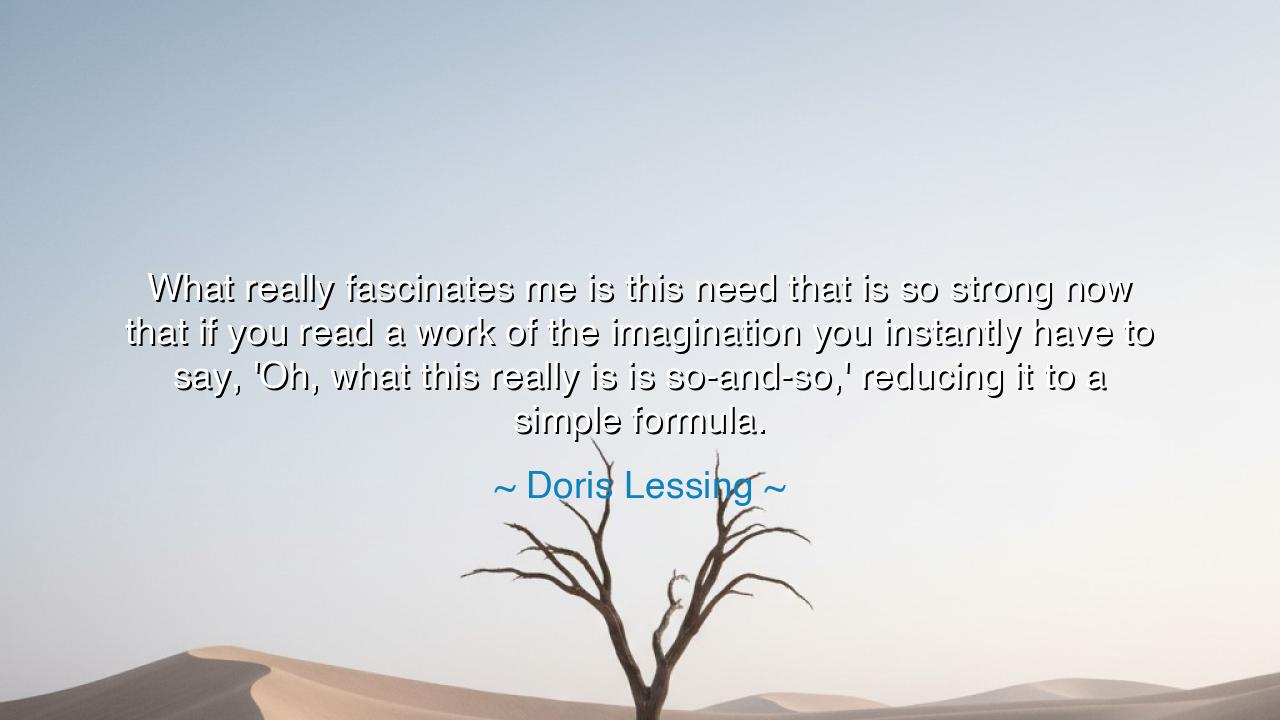
What really fascinates me is this need that is so strong now that
What really fascinates me is this need that is so strong now that if you read a work of the imagination you instantly have to say, 'Oh, what this really is is so-and-so,' reducing it to a simple formula.






Hear me, O seekers of wisdom, for the words of Doris Lessing hold a profound truth about the imagination, creativity, and the nature of understanding in the modern world. Lessing, with clarity and foresight, speaks of the deep need that has arisen in the age of rationalism and categorization — the need to reduce complex, imaginative works to simple formulas. She observes that whenever we encounter a work of the imagination, there is an instinct to immediately label it, to strip it of its mystery, its complexity, and its nuance, and to translate it into something familiar and easily understood. The world, she suggests, demands explanations, seeking to tame the boundless realms of the creative mind and make them fit into neat boxes. But in doing so, the true essence of art is often lost.
Consider, O wise ones, the nature of the imagination. The imagination is not a thing that can be easily contained or controlled. It is a force that transcends the boundaries of logic and reason, reaching into the realms of the unknown, the mysterious, and the ineffable. Works of the imagination are not meant to be simplified or reduced to easy formulas, for they are born of the human spirit and the vast depths of experience. To reduce them to mere labels is to dishonor the creative act itself, to strip away the very essence of what makes art alive. Lessing’s words remind us that art and creativity are meant to evoke questions, not easy answers. They are meant to stir the soul, not to satisfy the intellect’s need for closure.
This tendency to simplify, to reduce the vastness of creation to something digestible, is not a new phenomenon. The ancients, too, understood the challenge of meaning in art and literature. Consider the work of Homer, whose Iliad and Odyssey were not merely tales of gods and heroes, but profound reflections on the human condition, on fate, and on the very nature of life and death. The stories were not meant to be fully understood or explained; they were meant to stir the imagination and challenge the listener’s understanding of the world. And yet, as the centuries passed, scholars and interpreters have sought to break down these works into simple moral lessons or historical accounts, often stripping away the richness of symbolism and emotion that gave these works their power. Homer’s epics, like all great works of imagination, cannot be reduced to a formula — for they are meant to be lived, to be experienced, and to evoke the deep truths of the soul.
Think, O seekers, of the Renaissance artists, who created works not just for the eyes, but for the soul. Leonardo da Vinci, in his famous painting The Last Supper, did not simply depict a scene from the Bible, but captured the mystery of human emotions, the complexity of betrayal, loyalty, and sacrifice. No one would dare to reduce the painting to a mere depiction of historical events; it is an expression of human and divine truths that transcend time and space. And yet, in the modern age, we often find ourselves tempted to reduce such profound works to their simplest elements — to categorize them, to label them, to make them easily understood. This is the loss that Doris Lessing warns us of — the loss of the mystery and depth that gives art its true power.
The lesson of Lessing’s words is clear: do not seek to reduce the works of the imagination to simple formulas or easy labels. The imagination is meant to challenge us, to take us beyond the known and into the unknown. It is a force that should not be confined by reason or logic, but should be allowed to roam freely, to explore the boundless realms of possibility. Art, in all its forms, is meant to stir the soul and provoke thought. It is not meant to provide answers, but to inspire questions, to open the heart to the infinite possibilities that lie within the human spirit.
In your own lives, O children of the future, let this lesson guide you. Do not seek to simplify the complexities of life to make them more palatable, more comfortable, more predictable. Life, like art, is not meant to be understood in simple terms. It is meant to be experienced, to be felt, and to be lived fully. Embrace the mystery and complexity of the world, for it is in the unknown that true growth and discovery lie. And when you encounter works of the imagination, whether in art, literature, or life itself, resist the temptation to reduce them to simple labels. Instead, allow them to provoke you, to challenge you, to take you to places you have never been.
And above all, never forget the power of the imagination, for it is through this divine gift that we can transcend the limitations of the physical world and touch the very essence of our humanity. The work of the imagination is not to provide easy answers, but to open doors to new realms of thought, emotion, and experience. Let your own life be guided by this principle: never reduce, but always expand, always question, and always create. For in that, you will find the true magic of life.






AAdministratorAdministrator
Welcome, honored guests. Please leave a comment, we will respond soon